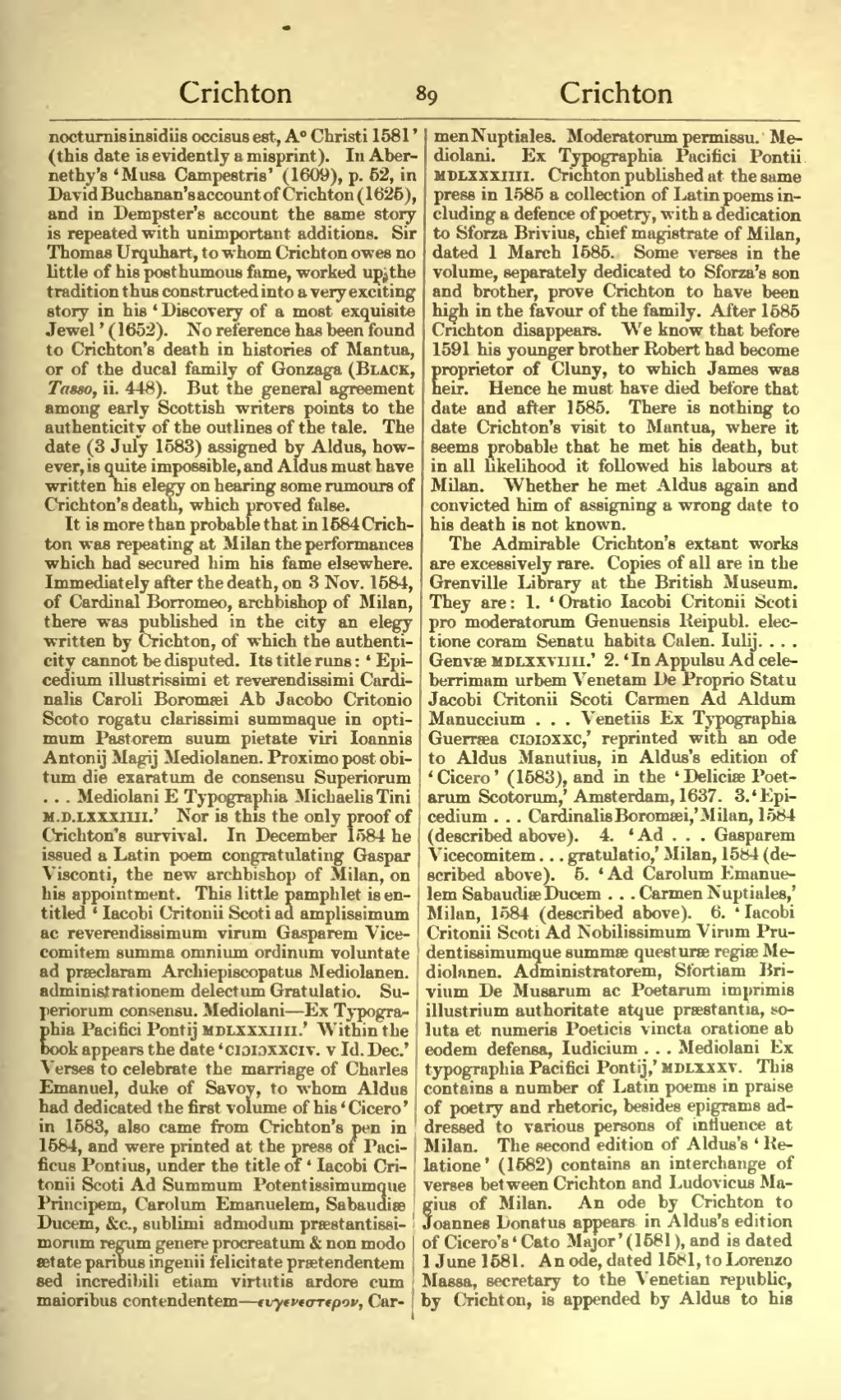nocturnis insidiis occisus est, Ao Christi 1581’ (this date is evidently a misprint). In Abernethy's ‘Musa Campestris’ (1609), p. 52, in David Buchanan's account of Crichton (1625), and in Dempster's account the same story is repeated with unimportant additions. Sir Thomas Urquhart, to whom Crichton owes no little of his posthumous fame, worked up the tradition thus constructed into a very exciting story in his ‘Discovery of a most exquisite Jewel’ (1652). No reference has been found to Crichton's death in histories of Mantua, or of the ducal family of Gonzaga (Black, Tasso, ii. 448). But the general agreement among early Scottish writers points to the authenticity of the outlines of the tale. The date (3 July 1583) assigned by Aldus, however, is quite impossible, and Aldus must have written his elegy on hearing some rumours of Crichton's death, which proved false.
It is more than probable that in 1584 Crichton was repeating at Milan the performances which had secured him his fame elsewhere. Immediately after the death, on 3 Nov. 1584, of Cardinal Borromeo, archbishop of Milan, there was published in the city an elegy written by Crichton, of which the authenticity cannot be disputed. Its title runs: ‘Epicedium illustrissimi et reverendissimi Cardinalis Caroli Boromæi Ab Jacobo Critonio Scoto rogatu clarissimi summaque in optimum Pastorem suum pietate viri Ioannis Antonij Magij Mediolanen. Proximo post obitum die exaratum de consensu Superiorum … Mediolani E Typographia Michaelis Tini m.d.lxxxiiii.’ Nor is this the only proof of Crichton's survival. In December 1584 he issued a Latin poem congratulating Gaspar Visconti, the new archbishop of Milan, on his appointment. This little pamphlet is entitled ‘Iacobi Critonii Scoti ad amplissimum ac reverendissimum virum Gasparem Vicecomitem summa omnium ordinum voluntate ad præclaram Archiepiscopatus Mediolanen. administrationem delectum Gratulatio. Superiorum consensu. Mediolani—Ex Typographia Pacifici Pontij mdlxxxiiii.’ Within the book appears the date ‘ciɔiɔxxciv. v Id. Dec.’ Verses to celebrate the marriage of Charles Emanuel, duke of Savoy, to whom Aldus had dedicated the first volume of his ‘Cicero’ in 1583, also came from Crichton's pen in 1584, and were printed at the press of Pacificus Pontius, under the title of ‘Iacobi Critonii Scoti Ad Summum Potentissimumque Principem, Carolum Emanuelem, Sabaudiæ Ducem, &c., sublimi admodum præstantissimorum regum genere procreatum & non modo ætate paribus ingenii felicitate prætendentem sed incredibili etiam virtutis ardore cum maioribus contendentem—eugenesteron, Carmen Nuptiales. Moderatorum permissu. Mediolani. Ex Typographia Pacifici Pontii mdlxxxiiii.’ Crichton published at the same press in 1585 a collection of Latin poems including a defence of poetry, with a dedication to Sforza Brivius, chief magistrate of Milan, dated 1 March 1585. Some verses in the volume, separately dedicated to Sforza's son and brother, prove Crichton to have been high in the favour of the family. After 1585 Crichton disappears. We know that before 1591 his younger brother Robert had become proprietor of Cluny, to which James was heir. Hence he must have died before that date and after 1585. There is nothing to date Crichton's visit to Mantua, where it seems probable that he met his death, but in all likelihood it followed his labours at Milan. Whether he met Aldus again and convicted him of assigning a wrong date to his death is not known.
The Admirable Crichton's extant works are excessively rare. Copies of all are in the Grenville Library at the British Museum. They are: 1. ‘Oratio Iacobi Critonii Scoti pro moderatorum Genuensis Reipubl. electione coram Senatu habita Calen. Iulij. … Genvæ mdlxxxiiii.’ 2. ‘In Appulsu Ad celeberrimam urbem Venetam De Proprio Statu Jacobi Critonii Scoti Carmen Ad Aldum Manuccium … Venetiis Ex Typographia Guerræa ciɔiɔxxc,’ reprinted with an ode to Aldus Manutius, in Aldus's edition of ‘Cicero’ (1583), and in the ‘Deliciæ Poetarum Scotorum,’ Amsterdam, 1637. 3. ‘Epicedium … Cardinalis Boromæi,’ Milan, 1584 (described above). 4. ‘Ad … Gasparem Vicecomitem … gratulatio,’ Milan, 1584 (described above). 5. ‘Ad Carolum Emanuelem Sabaudiæ Ducem … Carmen Nuptiales,’ Milan, 1584 (described above). 6. ‘Iacobi Critonii Scoti Ad Nobilissimum Virum Prudentissimumque summæ questuræ regiæ Mediolanen. Administratorem, Sfortiam Brivium De Musarum ac Poetarum imprimis illustrium authoritate atque præstantia, soluta et numeris Poeticis vincta oratione ab eodem defensa, Iudicium … Mediolani Ex typographia Pacifici Pontij,’ mdlxxxv. This contains a number of Latin poems in praise of poetry and rhetoric, besides epigrams addressed to various persons of influence at Milan. The second edition of Aldus's ‘Relatione’ (1582) contains an interchange of verses between Crichton and Ludovicus Magius of Milan. An ode by Crichton to Joannes Donatus appears in Aldus's edition of Cicero's ‘Cato Major’ (1581), and is dated 1 June 1581. An ode, dated 1581, to Lorenzo Massa, secretary to the Venetian republic, by Crichton, is appended by Aldus to his
